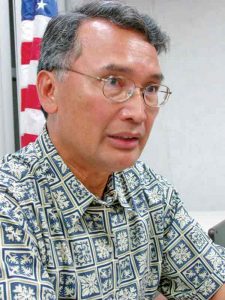‘Lottery for CW permits creates more headaches’

Babauta
U.S. Citizenship and Immigration Services’ lottery system for the approval of 4,999 CW permits for foreign workers is unfair and will only give the business community and small businesses more headaches, according to former governor Juan N. Babauta.
In an interview, Babauta said that one can look at the lottery system from the point of view that it is something that may or may not be within the CNMI’s control.
“However, we cannot just sit back and let things unfold the way that it has unfolded. That is why we are in position of trust in government so that we can work with our federal partners,” he said.
Babauta and former education commissioner Dr. Rita A. Sablan are running as independent candidates for governor and lieutenant governor in this November election.
When asked about the USCIS lottery system, Babauta underscored the importance of the CNMI working with federal government.
“I would have worked very hard to prevent the capping of CWs at 4,999 when I know that the federal government can have the discretion to either work so that we keep the 12,000 level all the way to Dec. 31, 2019, rather than putting a cap now,” he said.
Babauta pointed out that a lot of things could happen in the intervening period.
“One, we could have the legislation passed and become law before Dec. 31, 2019,” he said, referring to U.S. Sen. Lisa Murkowski’s (R-AK) S. 2325, or the U.S. Workforce Act.
Murkowski’s bill seeks to reset the CW cap for fiscal year 2019 to 13,000; provide additional validity to long-time CW workers; and extend the CNMI transitional period, along with programs under it such as the CW program and the E-2C investor program, to fiscal year 2029.
Delegate Gregorio Kilili C. Sablan (Ind-MP) simultaneously introduced H.R. 4869, an exact copy of the bill, in the U.S. House last Jan. 19.
Babauta said the CNMI does not have to go through a lottery that will reduce the number of CW workers from 12,000 to less than 5,000. Such reduction, Babauta said, is going to create another headache not just for the business community, but also to many small businesses here that hire critical CW workers.
“The lottery to me in this case is not fair,” the former governor said.
On the surface, Babauta said, the lottery looks like everybody has a chance to be drawn and pulled and given a CW permit.
He said what USCIS or U.S. Labor could have done is to look at critical categories of workforce in the CNMI that are badly needed and have that category be pulled at a lottery rather than the entire 12,000.
USCIS announced last week that it received an enough number of CW petitions for fiscal year 2019, which is 4,999, and would be using a lottery system for the approval of such permits.



























